Vanilla Sky
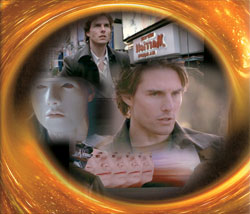 This film portrays the confusion between a person's real life and his imagination. Both the characters in the movie and the viewer have trouble telling one from the other. David Aames, the lead character, has a life anyone could wish for. He runs a large publishing business inherited from his father, and the people in his environment admire his physical appearance, financial status and social circle.
This film portrays the confusion between a person's real life and his imagination. Both the characters in the movie and the viewer have trouble telling one from the other. David Aames, the lead character, has a life anyone could wish for. He runs a large publishing business inherited from his father, and the people in his environment admire his physical appearance, financial status and social circle.
But one day, a traffic accident leaves him with terrible facial injuries and from then on, his life disintegrates rapidly. His friends all desert him. Feeling particularly lonely and unhappy, he signs a contract with a firm that will "supply" him with "lucid dreams" for the rest of his life. He acquires an artificial life, taking place only in his mind, in which he can be the age he wants, have the looks and be with the people he wants. But as with dreams, he is misled to believe in this daydream's reality, remaining unaware that his experiences are all imaginary.
Dream or Real Life?
In dreams, you have no control over your experiences. Suddenly, during your sleep, you find yourself in the middle of them, without choosing the place, time, or storyline. Despite their surreal sense of logic and incomprehensible laws of nature, many dreams do not appear strange to you. In reality, you don't have the use of your hands or eyes; there is nothing to see or hold on to, but to you, everything is real, solid, and visible.
What, then, is the difference between a dream and the life we acknowledge as real? If you suggest that real life is continuous and dreams come in intervals, or that different cause-effect rules apply in dreams, these assertions are not all that relevant. Both lives take place in the brain. If we can live in an unreal world during a dream, then this should also be possible for the world we're in. There is no rational objection to the suggestion that when we wake from a dream, we begin a new and longer one called real life.
The main theme of Vanilla Sky is this same confusion, which every human can experience. In one of opening scenes, lead character David wakes up to his electronic alarm clock. Noticing that the time is 9:05 AM, he gets up, washes his face, picks out a stray hair from his head, then leaves in his car for work. Strangely, he sees the usually busy New York streets are deserted. Everything—buildings, cars—is in place, but no human being is to be seen anywhere. Just as the anxiety of this situation descend upon him, he wakes up again to his alarm clock. Everything he dreamed before, he experiences this time for real. He looks at the time, sees that it is 9:05, washes his face, looks at the mirror, and plucks out a strand of hair. Then he gets in his car to leave for work. This time, there are people on the street.
As you can see in the accompanying illustrations, it's possible for you to see yourself doing the same things in a dream as you do in real life, never suspecting that the experience is not a real.
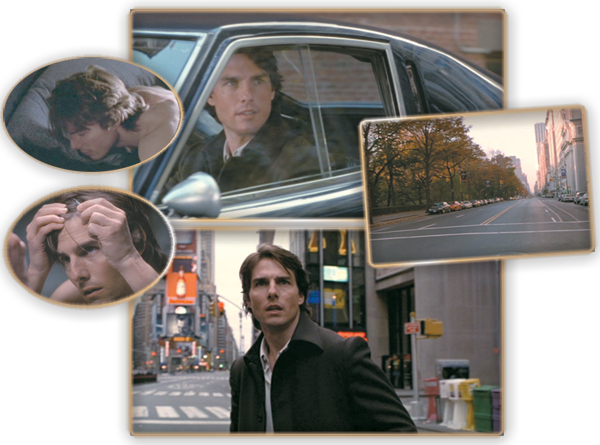
Some passages from our books expand on this observation:
• Even if someone is attacked by a dog, that doesn't change the fact that he sees it all in his brain. In a dream, one could see the same incident with the same clarity and experience the same excitement and fear.(Matter: The Other Name for Illusion, p.180)
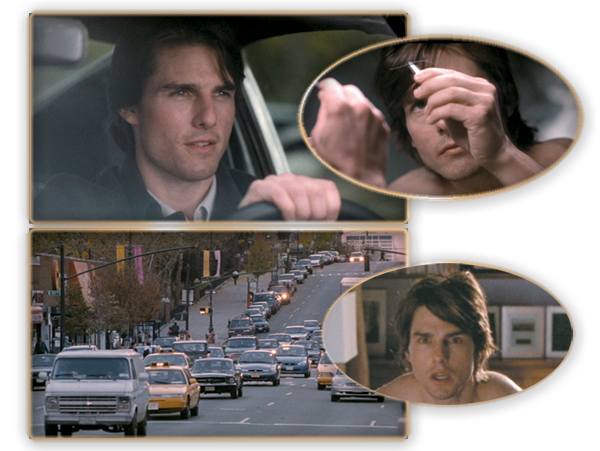
In another scene of Vanilla Sky, David relates to his friend Sofia how his dreams affect him:
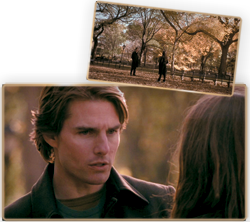
| David | : | No, actually, I had a horrible dream… I went downstairs to the car, and my friend…had followed me there… She was upset... about—I don't know. Igot in the car and... she drove off a bridge... |
|---|---|---|
| Sofia | : | I thought you were going straight to work ... |
| David | : | But I survived with my arm and my face reconstructed. And what's worse, is that I can't wake up... My dreams are a cruel joke. They taunt me. Even in my dreams, I'm an idiot, who knows he's about to wake up to reality. If I could only avoid sleep. But I can't... It never works. |
Why can confusion occur between reality and dream? The main reason is that both experiences take place in the mind. As we mentioned throughout this book, what we call real life is nothing but electrical signals affecting the brain. What we experience as very real can't be taken as evidence; because we are always interacting with the interpretations of perceptions in our brains. We can never be sure what the material correspondents to our perceptions are really like in the external world. Just like in our dreams ...
 |
|---|
| For a sleeping child, the football match in his dream is totally real. He could be seeing his friends just as their voices and appearances really are. He could feel the exhaustion of chasing the ball, or his heart racing with the excitement of winning the game. But these are all perceptions with no physical cause or reality. |
In the following scene, David's doctor asks him whether he can distinguish between reality and dream. At first, David is adamant that he can. But the more he tries to remember his past memories, the less certain he becomes, until he admits that he can't. (Even better, when this conversation takes place, David is actually living in an imaginary world specially created for him!)
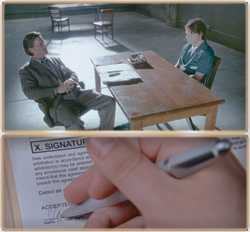
| Doctor | : | Who is the man in the restaurant? Who is it? |
|---|---|---|
| David | : | I can't … |
| Doctor | : | Can you tell the difference between dreams and reality? |
| David | : | Of course. Can you? |
| Doctor | : | Think with your head. You signed a contract... did you not? |
| David | : | I signed something. |
| Doctor | : | Was the man in the restaurant there? Accept your body's resistance. Let your head answer. |
| David | : | Yes—that's right. (The paper he signed and the technician suddenly come to mind) |
| Doctor | : | Who is Ellie? |
| David | : | I don't know what's real. |
This scene is thought-provoking. It's possible to be fooled by a vision's realism and take an imaginary world for real. David, living within artificially induced dreams, genuinely believes in the reality of his past experiences. The same is true for many people's present lives. No matter how adamant people are that the images, voices or feelings they interact with are real, these are only copies existing in the mind—in other words, imaginary copies of things they can never actually reach.
Below are two explanations from our other books, along the line that we've set forth in this one:
• ... It's very easy to be deceived that perceptions with no material correlates are real. Often in our dreams we experience events, see people, objects and settings that seem completely real. But they are all nothing but mere perceptions. There is no basic difference between the dream and the "real" world; both are experienced in the brain.(The Evolution Deceit, 7th edition, p.226)
• As a result of artificial stimulations, a physical world seemingly as true and realistic as the real, physical one can be formed in our brain. As a result of artificial stimulations, a person may think that he is driving his car, while he is actually sitting at home.(The Evolution Deceit, Second edition, p.223)
Never Forget That You Are the Spectator of A World You Cannot Reach
Lift your head and look around the room you're in. You feel that you're occupying a certain space in a room outside of you. You are certain that the floor is under your feet, sure that the space around you is filled with air. But this realistic perception misleads you, as it does millions of others, because it is so perfectly concise and three-dimensional.
In reality, your family, home, school, and workplace are all created for you in your mind. The Sun, Moon and stars orbit inside you. In short, you are not in the world, but the world is inside of you.
For a better understanding of this subject, the imaginary world the film calls "lucid dream" can be an eye-opening example. The following paragraph contains an introductory message from the company offering an imaginary world in the form of dreams. Even though these claims are taken from the film, recent advances in technology make them real. For willing candidates, present-day means can create a virtual environment and its illusion of reality.
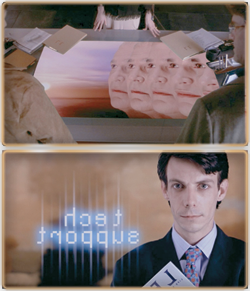
| Advertising Voice-Over | : | I have a universe inside me. Portrait of a modern human life. American, male ... birth and death… continue your own life as you know it now ... You will continue in an ageless state ... preserved, but living in the present ... with a future of your choosing. Your life will continue as a realistic work of art ... painted by you, minute to minute ... and you'll live it with the romantic abandon of a summer day with the feeling of a great movie or a pop song you always loved, with no memory of how it all occurred ... save for the knowledge ... that everything simply improved. In any instance of discontent ... you'll be visited by technical support. The day after tomorrow, another chapter begins seamlessly. A living dream. |
|---|---|---|
| Woman | : | A living dream. The dream of peace. . . the dream of achievement ... The dream of hearing someone say these words ... When they really, truly mean them ... This is a revolution of the mind. |
As we've seen, David signs a contract that guarantees him a real quality dream world in which he'll be happy. But one requirement of this dream world is that he won't remember the contract he signed. Consequently, he's led to believe that his happiness is real. However, the reality is different: His body is kept in a dedicated environment where he is shown the realistic visions he so desires.
In one scene, a technical problem forces one of the company's employees to reveal the true state of affairs. David's reaction is explosive—he doesn't want to acknowledge that he's been living in a dream world. The company employee has no other choice but to freeze the images in this virtual reality environment, thereby proving their total control over the visions shown to David.
| Technician | : | Problems? |
|---|---|---|
| David | : | I'm in no mood to be messed with, so do yourself a favor— |
| Technician | . | There's an explanation for all this, David… You and I know each other. You found me on the Internet. I'm here to help you, David. |
| David | : | Who are you? Why are you following me? |
| Technician | : | First of all, it's very important that you calm down. |
| David | : | Calm down? |
| Technician | : | Calm down. You must overcome your fears and regain control. |
| David | : | Look, I'm fine. Okay? |
| Technician | : | David, look at all these people. Seems as though they're just all chatting away, doesn't it? |
| David | : | Yeah. |
| Technician | : | Nothing to do with you. |
| David | : | No. |
| Technician | : | And yet... maybe they're only here because you wanted them to be here. You can make them obey you or even destroy you. |
| David | : | Well, what I'd love for them to do is shut up. Especially you. |
| Technician | : | You see? You and I signed a contract, David… |
| David | : | What happened in my real life? Something happened. |
| Technician | : | Do you really want to know? |
| David | : | Tell me everything. . . So all I have to do is imagine something. Like, if I wanted McCabe (the doctor) to come back right now? |
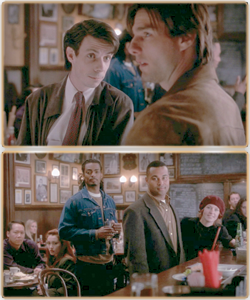 As we have seen, people can be artificially made to think that things are real, that they can touch objects around them, or that they can taste what they eat and are happily laughing in a vivid world, and this reality is all dealt with in the film.
As we have seen, people can be artificially made to think that things are real, that they can touch objects around them, or that they can taste what they eat and are happily laughing in a vivid world, and this reality is all dealt with in the film.
It's of utmost importance to understand this reality, because people who become aware of this secret behind matter will enjoy a very different frame of mind. With the realization of matter's true nature, people will easily understand where Allah is, the existence of paradise and hell, the nature of the soul, life after death, and infinity. Take, for instance, anyone who previously held a materialistic worldview or was raised under its influence and couldn't comprehend these matters. Realizing that matter is perceived as an illusion, he will clearly see that Allah is the only absolute being.
As a consequence, he'll realize the pointlessness of cravings, passions and everything else one selfishly desires. Vanity and pride will give way to modesty and mildness; tightfistedness and egotism will be replaced with helpfulness and selflessness; distrust and depression with contentment and inner peace. Anyone who understands that matter is an illusion, is freed from struggling amid events and people. He'll know that every good and every evil is from Allah and, therefore, will seek Allah's help in everything he undertakes and pray only to Him. He doesn't value that all the things people crave, such as status, wealth, luxurious cars and designer clothes, because he knows they're only illusions Allah created for the purpose of testing people.
Also, anyone who realizes that matter and space are illusory is freed from the fear of anything and anyone besides Allah. He is aware that Allah created everything he perceives, and that unless He wills it, nothing can harm him in any way. When people realize that those they look up to are actually shadow beings, they'll believe in Allah without ascribing to Him any partners or associates. They won't be led astray by the illusionary enjoyment of life and will strive to win Allah's approval.
In our books, we've written extensively about how realizing matter's illusionary nature improves people's frame of mind:
Certainly Allah, the Absolute Being, knows every aspect of the human beings whom He has created. This is a very easy thing for Allah. But some, in their ignorance, may find this hard to understand. However, we observe the impressions that we think belong to the "external world" we experience As we lead our lives, the closest being to us is no illusion, but clearly Allah. In this fact is hidden the secret of the verse, "We created man and We know what his own self whispers to him. We are nearer to him than his jugular vein." (Surah Qaf: 16) As long as a person thinks he has direct experience of the original of his own body he cannot conceive of this important reality; again because he thinks his body is the nearest thing to him. For example, if he conceives of his existence as being his brain, he doesn't admit the possibility that there is a Being even closer to him.
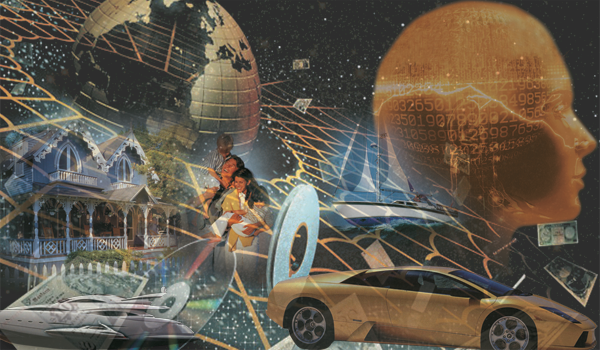 |
|---|
| With the realization that everything is a copy or image in the brain, it becomes clear that cravings for material goods, the children that people feel proud of, and the superiority they feel because of their rank, are all really illusions. |
• … That everything is an image is a very important implication that renders all
lusts and boundaries meaningless. Verifying this makes it clear that everything people toil to possess—their wealth accumulated with greed, their children whom they boast of, their spouses whom they consider closest to them, their dearest friends, their superior rank, the schools they have attended, the holidays they enjoy—have been nothing but mere illusion. Therefore, all their efforts, time spent, and greed felt prove unavailing. This is why some people make unwitting fools of themselves by boasting of their wealth and the yachts, helicopters, factories, manors and lands they hold—as if they were experiencing the originals of these. In fact, these are scenes seen many times in dreams, as well. In dreams, they also own houses, fast cars, precious jewels, rolls of banknotes, and loads of gold and silver. In their dreams also, they are positioned in high rank, own factories with thousands of workers, possess power over many, wear clothes that excite everyone's admiration… Just as boasting about one's possessions in a dream brings him ridicule, he is equally sure to be ridiculed for boasting of the images he sees in this world. After all, what he sees in dreams and in this world are both merely images in his mind.(The Evolution Deceit, 7th edition, pp.232-233)
• Everything a person owns—a large holding company, and houses, the latest model cars, and employees who show him respectful deference—are impressions in his brain. The esteem he enjoys is also in his brain. What he considers serious and important—the work to which he devotes a large amount of time, his meetings with colleagues, the decisions he makes—are all impressions occurring in his brain. A person who counts his money with great satisfaction is actually counting it in his brain. He doesn't realize that the yacht he sails with so much pride and ostentation, and the people he tries to impress, are all impressions formed in his brain. Were he told the truth, he would forcefully reject it, in order not to lose all the things he owns and the esteem he enjoys. But while dreaming that he owns all these things, he never doubts their reality. In his dream, he would not accept that he isn't these things' real owner. But when he woke, he would grasp that it was all a fantasy.(Matter: The Other Name for Illusion, pp.110-111)
